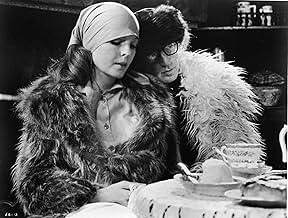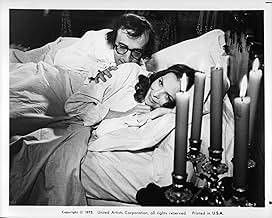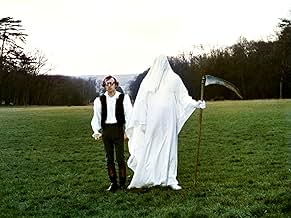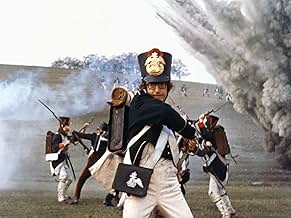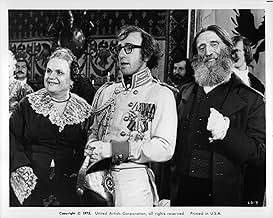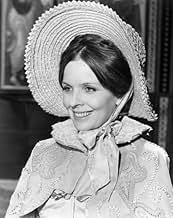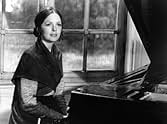AVALIAÇÃO DA IMDb
7,6/10
43 mil
SUA AVALIAÇÃO
Na Rússia czarista, um soldado neurótico e seu primo distante formulam uma trama para assassinar Napoleão.Na Rússia czarista, um soldado neurótico e seu primo distante formulam uma trama para assassinar Napoleão.Na Rússia czarista, um soldado neurótico e seu primo distante formulam uma trama para assassinar Napoleão.
- Direção
- Roteirista
- Artistas
- Prêmios
- 1 vitória e 1 indicação no total
Féodor Atkine
- Mikhail
- (as Feodor Atkine)
Yves Barsacq
- Rimsky
- (as Yves Barsaco)
Gérard Buhr
- Servant
- (as Gerard Buhr)
Henri Czarniak
- Ivan
- (as Henry Czarniak)
Avaliações em destaque
Watching Love And Death today I had the feeling that back when Woody Allen was going to Midwood High School in Brooklyn, a few years before I did, he was forced to do a book report on War And Peace and hated it. He vowed to get even with Tolstoy and all the rest of those heavy Russian dramatists and in Love And Death I do believe he succeeded.
And if you ever were forced to sit through all that turgid prose and heavy dramatics than Love And Death is the film you've longed for. The time is the Napoleonic Wars and the flower of Russian manhood is answering the colors. But Woody comes from a different patch than the other flowers bloomed in and he's not that crazy about sacrificing for old mother Russia.
The overall tone of Love And Death is a homage to Groucho Marx and years earlier I could have seen the Marx Brothers doing something like Love And Death with a bit more creative control, just like what Woody Allen has with his movies. But the military scenes were out of the Bob Hope school of cowardice playbook.
Lest anyone think that only Russian literature got a good satire, Allen includes a take off on Eugene O'Neill's Strange Interlude as Allen and Diane Keaton both go into those stage soliloquys about what the future holds for them as a couple.
Love And Death a must for Woody Allen and a missionary film for those looking to convert someone to being a Woody Allen fan.
And if you ever were forced to sit through all that turgid prose and heavy dramatics than Love And Death is the film you've longed for. The time is the Napoleonic Wars and the flower of Russian manhood is answering the colors. But Woody comes from a different patch than the other flowers bloomed in and he's not that crazy about sacrificing for old mother Russia.
The overall tone of Love And Death is a homage to Groucho Marx and years earlier I could have seen the Marx Brothers doing something like Love And Death with a bit more creative control, just like what Woody Allen has with his movies. But the military scenes were out of the Bob Hope school of cowardice playbook.
Lest anyone think that only Russian literature got a good satire, Allen includes a take off on Eugene O'Neill's Strange Interlude as Allen and Diane Keaton both go into those stage soliloquys about what the future holds for them as a couple.
Love And Death a must for Woody Allen and a missionary film for those looking to convert someone to being a Woody Allen fan.
As a huge Woody Allen fan, I was delighted and surprised by this film. I have scarcely heard anyone mention it, but for my money it is the single most comically dense of all of Woody's films. There are so many truly impressive/hilarious/memorable one-liners that I'm amazed people don't quote this movie left and right. The setting, costumes, accents all add to the hilarity of the film--truly reminiscent of a Marx Brothers romp. Really outstanding among his pre-Annie Hall films. Only rivaled by Bananas in my opinion for simple laugh value.
Unlike any other of his films, this deals with his "deep" questions of death/metaphysics in an unflaggingly light and comical fashion. For instance:
Sonja: But judgment of any system or a priori relation of phenomena exists in any rational or metaphysical or at least epistemological contradiction to an abstracted empirical concept such as being or to be or to occur in the thing itself or of the thing itself.
Boris: Yeah, I've said that many times.
Not Woody's "best" film (see Annie Hall, Manhattan, Crimes and Misdemeanors), but perhaps his most laugh-filled. Satisfying throughout. I give it a 9/10.
Unlike any other of his films, this deals with his "deep" questions of death/metaphysics in an unflaggingly light and comical fashion. For instance:
Sonja: But judgment of any system or a priori relation of phenomena exists in any rational or metaphysical or at least epistemological contradiction to an abstracted empirical concept such as being or to be or to occur in the thing itself or of the thing itself.
Boris: Yeah, I've said that many times.
Not Woody's "best" film (see Annie Hall, Manhattan, Crimes and Misdemeanors), but perhaps his most laugh-filled. Satisfying throughout. I give it a 9/10.
This movie is considered to be a spoof of Russian Novels . It is set in czarist Russia, 1812 , a neurotic Boris Grushenko (Woody Allen) wishes to marry his distant cousin (Diane Keaton) . Although both of whom take two divergent ways in their lives, those paths cross once again . When Napoleon threatens to invade the Russian Empire, the coward soldier is forced to enlist to save his natal nation . Later on , Boris and his lover cousin formulate a scheme to assassinate Napoleon (James Tolkan) . At the end he is detained and the condemned man reviews his past life .
Amusing picture fable is plenty of the filmmaker's signature angst-ridden philosophical comedy . Hilarity slips into vulgarity rather too often in this usually in-and-out early Woody Allen comedy which embroils the little man in Russia invaded by Napoleon . Like a Russian soldier , the gags and funny sketches fire off in all directions . There is a lot of spoofs and even Bergman's ¨The seventh seal¨ and ¨Persona¨ and jokes for moviegoers . As the movie featured the Death character of The Grim Reaper , Allen is known to be inspired and influenced by Swedish filmmaker Ingmar Bergman who had featured the Grim Reaper in his film The seventh seal (1957) ; in the Bergman film the Grim Reaper wears black robes whereas in this film he wears a white gown . The picture is ironical about major Russian novels particularly the works of Leo Tolstoy and Fyodor Dostoevsky . In fact , the movie title is a play on words of such Russian novel titles as Leo Tolstoy's "War and Peace" and Fyodor Dostoevsky's "Crime and Punishment" . Nice acting by Woody Allen at his best , as a condemned man who reviews the follies of his life . His comic style paid homage to a number of classic comedians which included Bob Hope , Charles Chaplin and The Marx Brothers . Intermittently hilarious , pre-Annie Hall Allen fare , it is is one of eight cinema movie collaborations of Woody Allen and actress Diane Keaton, Allen co-starring in six of them and directing seven of them . These are the followings : Play It Again Sam , Sleeper , Interiors , Manhattan , Radio Days , and Manhattan Murder Mystery . It is fun enough to make wish there were more of it and you will have to keep your eyes peeled to spot notorious secondaries as Jessica Harper , Harold Gould , Olga Georges Picot , Féodor Atkine , Gérard Buhr , Howard Vernon and James Tolkan as Napoleón and his double and about ¨fifty-four supporting players" .
Witty as well as classical musical score contributes much . At the beginning the soundtrack was taken from Igor Stravinsky music , but , subsequently , Woody Allen took Sergei Prokofiev's lighthearted score that worked far better . The movie's big battle sequence features Sergei Prokofiev's cantata music from Sergei M. Eisenstein's epic Alexánder Nevsky (1938). Colorful as well as evocative cinematography by Ghislain Cloquet , being shot on location in Hungary and Paris , France . Lavish and stunningly produced by Charles H. Joffe , Allen's ordinary producer . This enjoyable motion picture was vigorously directed by Woody Allen , being his sixth film as director and here to ridicule Russian novels such as "The Idiot", "The Gambler", "War and Peace", "Anna Karenina", "Crime and Punishment", and "The Brothers Karamazov". Woody Allen has said that this movie was "my funniest picture to that time".
Amusing picture fable is plenty of the filmmaker's signature angst-ridden philosophical comedy . Hilarity slips into vulgarity rather too often in this usually in-and-out early Woody Allen comedy which embroils the little man in Russia invaded by Napoleon . Like a Russian soldier , the gags and funny sketches fire off in all directions . There is a lot of spoofs and even Bergman's ¨The seventh seal¨ and ¨Persona¨ and jokes for moviegoers . As the movie featured the Death character of The Grim Reaper , Allen is known to be inspired and influenced by Swedish filmmaker Ingmar Bergman who had featured the Grim Reaper in his film The seventh seal (1957) ; in the Bergman film the Grim Reaper wears black robes whereas in this film he wears a white gown . The picture is ironical about major Russian novels particularly the works of Leo Tolstoy and Fyodor Dostoevsky . In fact , the movie title is a play on words of such Russian novel titles as Leo Tolstoy's "War and Peace" and Fyodor Dostoevsky's "Crime and Punishment" . Nice acting by Woody Allen at his best , as a condemned man who reviews the follies of his life . His comic style paid homage to a number of classic comedians which included Bob Hope , Charles Chaplin and The Marx Brothers . Intermittently hilarious , pre-Annie Hall Allen fare , it is is one of eight cinema movie collaborations of Woody Allen and actress Diane Keaton, Allen co-starring in six of them and directing seven of them . These are the followings : Play It Again Sam , Sleeper , Interiors , Manhattan , Radio Days , and Manhattan Murder Mystery . It is fun enough to make wish there were more of it and you will have to keep your eyes peeled to spot notorious secondaries as Jessica Harper , Harold Gould , Olga Georges Picot , Féodor Atkine , Gérard Buhr , Howard Vernon and James Tolkan as Napoleón and his double and about ¨fifty-four supporting players" .
Witty as well as classical musical score contributes much . At the beginning the soundtrack was taken from Igor Stravinsky music , but , subsequently , Woody Allen took Sergei Prokofiev's lighthearted score that worked far better . The movie's big battle sequence features Sergei Prokofiev's cantata music from Sergei M. Eisenstein's epic Alexánder Nevsky (1938). Colorful as well as evocative cinematography by Ghislain Cloquet , being shot on location in Hungary and Paris , France . Lavish and stunningly produced by Charles H. Joffe , Allen's ordinary producer . This enjoyable motion picture was vigorously directed by Woody Allen , being his sixth film as director and here to ridicule Russian novels such as "The Idiot", "The Gambler", "War and Peace", "Anna Karenina", "Crime and Punishment", and "The Brothers Karamazov". Woody Allen has said that this movie was "my funniest picture to that time".
When Napoleon invades the Russian Empire during the Napoleonic wars, Boris Grushenko (Woody Allen), a "militant coward" and pacifist scholar, is forced to enlist in the Russian Army, desperate and disappointed hearing the news that his cousin Sonja (Diane Keaton) is to wed a herring merchant.
The film is full of philosophical and pseudo-philosophical commentary. In one instance, a priest suggests that Spinoza proves God's existence. Boris and Sonja banter back and forth about epistemology and such, and only once does Sonja really offer any advice worth taking in: that "to love is to suffer and to not know love is to suffer", which really amounts to little more than "life is suffering", something the Buddhists or Schopenhauer would have embraced.
But then again, you have wise men spouting off silliness, including the view that German Jews have stripes, and Russian Jews have horns. We are left to conclude, as Boris quickly does, that being logical in an illogical world is a complex and unfavorable situation.
It has been said that the use of Sergei Prokofiev for the soundtrack adds to the Russian flavor of the film. Other parts referencing Russian culture include a dialogue between Boris and his father with each line alluding to or being composed entirely of Dostoevsky titles. This is crucial to really get the point of how backwards everything was across.
I was not able to fully appreciate the film because I am ignorant of its references to the works of Bergman (notably "Persona" and "Smiles of a Summer Night"). But that is true of much of Allen's work, I think. His constant references to Dostoevsky did reach me but may have been missed by others. Yet, even if few completely "get" the picture, it remains beautiful and humorous just the same. Allen has called this his favorite picture, even more so than "Annie Hall". I have to see more to be sure, but as of now I am inclined to agree.
The film is full of philosophical and pseudo-philosophical commentary. In one instance, a priest suggests that Spinoza proves God's existence. Boris and Sonja banter back and forth about epistemology and such, and only once does Sonja really offer any advice worth taking in: that "to love is to suffer and to not know love is to suffer", which really amounts to little more than "life is suffering", something the Buddhists or Schopenhauer would have embraced.
But then again, you have wise men spouting off silliness, including the view that German Jews have stripes, and Russian Jews have horns. We are left to conclude, as Boris quickly does, that being logical in an illogical world is a complex and unfavorable situation.
It has been said that the use of Sergei Prokofiev for the soundtrack adds to the Russian flavor of the film. Other parts referencing Russian culture include a dialogue between Boris and his father with each line alluding to or being composed entirely of Dostoevsky titles. This is crucial to really get the point of how backwards everything was across.
I was not able to fully appreciate the film because I am ignorant of its references to the works of Bergman (notably "Persona" and "Smiles of a Summer Night"). But that is true of much of Allen's work, I think. His constant references to Dostoevsky did reach me but may have been missed by others. Yet, even if few completely "get" the picture, it remains beautiful and humorous just the same. Allen has called this his favorite picture, even more so than "Annie Hall". I have to see more to be sure, but as of now I am inclined to agree.
For me Love & Death and Sleeper were Allen's zenith for slapstick, one-liner comic-gag comedy. After the relatively immature but amusing Bananas & Everything You always Wanted To Know About Sex, Allen goes up a notch in the intellectual comedy stakes to produce this fine send-up of Russian culture & historical caricature.
Even though some of the one-liner jokes don't always come off it doesn't matter because you never really get chance to think too much about how droll it is because Allen has another half dozen gags waiting in the wings.
But I've often found that Allen works best when he has a foil for his anarchic humour: and thank the Lord he managed to find the wonderful talent of Ms Keaton. She may not be his intellectual equal but she can run him to ground in nearly everything else. She has a kind of naive charm in this movie, always daydreaming, never really listening to Allen's mutterings & jabberings. And with this naivity brings warmth, humility and a general sense of well being.
At the same time Allen can release all his pentup emotions, fears, neo-neurosis to Keaton knowing full well that she wouldn't have a single notion as to what he was on about.
And thats what makes this partnership so durable whether it be here in Love & Death, or Sleeper, Annie Hall or Manhattan Murder Mystery. The scripts may vary but they're held together by the spontaneity of the two stars.
It should be said also that Love & Death breaks new ground for Allen, because even though he still relies on the childish humour of his earlier films, it is also quite clear that he is more forthcoming with his angst against a problematic world. His philosophic nuances dominate a lot of the film, which he will put to more practical use in his latter films like Annie Hall & Manhattan. But here he gets the mix between jokes & existentualism just right.
Love & Death is quite literally a laugh a minute. Whatever people may say about his recent personal problems it cannot be denied that this guy is a pure talent and should be cherished for what he is - a man that makes the world a happier place, if only for a few hours!
****/*****
Even though some of the one-liner jokes don't always come off it doesn't matter because you never really get chance to think too much about how droll it is because Allen has another half dozen gags waiting in the wings.
But I've often found that Allen works best when he has a foil for his anarchic humour: and thank the Lord he managed to find the wonderful talent of Ms Keaton. She may not be his intellectual equal but she can run him to ground in nearly everything else. She has a kind of naive charm in this movie, always daydreaming, never really listening to Allen's mutterings & jabberings. And with this naivity brings warmth, humility and a general sense of well being.
At the same time Allen can release all his pentup emotions, fears, neo-neurosis to Keaton knowing full well that she wouldn't have a single notion as to what he was on about.
And thats what makes this partnership so durable whether it be here in Love & Death, or Sleeper, Annie Hall or Manhattan Murder Mystery. The scripts may vary but they're held together by the spontaneity of the two stars.
It should be said also that Love & Death breaks new ground for Allen, because even though he still relies on the childish humour of his earlier films, it is also quite clear that he is more forthcoming with his angst against a problematic world. His philosophic nuances dominate a lot of the film, which he will put to more practical use in his latter films like Annie Hall & Manhattan. But here he gets the mix between jokes & existentualism just right.
Love & Death is quite literally a laugh a minute. Whatever people may say about his recent personal problems it cannot be denied that this guy is a pure talent and should be cherished for what he is - a man that makes the world a happier place, if only for a few hours!
****/*****
Você sabia?
- CuriosidadesIn an interview with 'Esquire' magazine, Woody Allen once said of the making of this movie: "When good weather was needed, it rained. When rain was needed, it was sunny. The cameraman was Belgian, his crew French. The underlings were Hungarian, the extras were Russian. I speak only English - and not really that well. Each shot was chaos. By the time my directions were translated, what should have been a battle scene ended up as a dance marathon. In scenes where Keaton and I were supposed to stroll as lovers, Budapest suffered its worst weather in twenty-five years".
- Erros de gravaçãoThe young Boris has blue eyes, but the adult Boris has brown eyes.
- Citações
Sonja: To love is to suffer. To avoid suffering one must not love. But then one suffers from not loving. Therefore, to love is to suffer; not to love is to suffer; to suffer is to suffer. To be happy is to love. To be happy, then, is to suffer, but suffering makes one unhappy. Therefore, to be unhappy, one must love or love to suffer or suffer from too much happiness. I hope you're getting this down.
- Cenas durante ou pós-créditosRussian composer Sergei Prokofiev is listed in the credits as "S. Prokofiev," just the way he would have been listed in the credits of a Russian film.
- Versões alternativasThe MGM DVD release deletes the pre-title Prokofiev overture.
- ConexõesFeatured in V.I.P.-Schaukel: Episode #7.3 (1977)
Principais escolhas
Faça login para avaliar e ver a lista de recomendações personalizadas
Detalhes
- Data de lançamento
- País de origem
- Central de atendimento oficial
- Idioma
- Também conhecido como
- Love and Death
- Locações de filme
- Empresa de produção
- Consulte mais créditos da empresa na IMDbPro
Bilheteria
- Orçamento
- US$ 3.000.000 (estimativa)
- Faturamento bruto nos EUA e Canadá
- US$ 20.123.742
- Faturamento bruto mundial
- US$ 20.123.742
Contribua para esta página
Sugerir uma alteração ou adicionar conteúdo ausente

Principal brecha
What is the Hindi language plot outline for A Última Noite de Bóris Grushenko (1975)?
Responda

